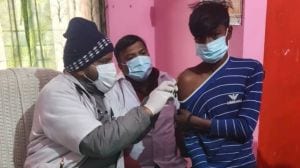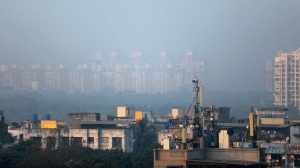Fever Pitch
CHANDIGARH, June 23: Day one: Rakesh Mathur 28 had been suffering from fever for three consecutive days. Suspecting malaria, the local pra...

CHANDIGARH, June 23: Day one: Rakesh Mathur 28 had been suffering from fever for three consecutive days. Suspecting malaria, the local practitioner gives him chloroquine tablets. The fever comes down, giving Rakesh some relief.
Day two: Fever again, with severe abdominal pain and loose motions. The doctor now suspects gastroenteritis and gives Rakesh the necessary medication.
Day six: Rakesh8217;s condition worsens. He begins vomiting and losing blood through the rectum.
Day nine: He stops recognising his relatives and feels very drowsy, which is when he is brought to a municipal hospital in Mumbai.
Examinations reveal that he had been suffering from low blood pressure, speen enlargement, a stiff abdomen and ruptured intestines. The blood tests show typhoid. Surgery is conducted to sew up the intestines but, unfortunately, it comes too late. Rakesh dies on the surgical table.
If the above mentioned scene sounds familiar, a few statistics may explain. There are 12.5 million cases of typhoid in the world, of which 2.5 million occur in India. According to Dr Vishwanath Nair, 55 per cent of deaths due to typhoid occur in the age group of fifteen to fifty four; and 22 per cent in the age group of one to four years.
The basics
Typhoid fever is a life-threatening illness caused by the bacterium Salmonella Typhi. It is the fifth most communicable disease in India, next to TB, polio, diphtheria, tetanus and malaria. Persons with typhoid fever carry the bacteria in their bloodstream and intestinal tract.
In addition, a small number of persons, called carriers, recover from typhoid fever but continue to carry the bacteria. Both patients and carriers shed the bacterium in their faeces and, to some extent, the urine. Germs are spread by drinking water or eating contaminated floods.
Symptoms
Generally appearing one to three weeks after exposure, these may include fever, headache, constipation and or diarrhoea alternating with each other, rose-colored spots on the body and an enlarged spleen and liver. In severe cases, bleeding through the rectum may occur, accompanied by low pressure and very weak pulse.
Solutions
Detection is possible through blood tests like the Widal test and Clot Culture. Urine and faecal tests reveal the disease only in the second and third week. As for antibiotics, Ciroflaxin is effective against typhoid in its early stages. it is a seven days course that requires two tables to be taken daily. The dose costs around Rs 800. Cetriaxone is a stronger medication, with a seven day dose costing Rs 4000.
There is now a new single dose oral vaccine which is available in India, marketed by certain pharmaceutical companies in collaboration with their foreign counterparts. It is in capsular form and needs to be taken with cold or luke warm water every alternate day for three days, an hour before consuming food.
What this vaccine causes is Herd Immunity which simply means that an individual who has not been vaccinated can also be immunised, as the vaccine uses the same path as typhoid germs 8211; through the food canal and out the rectum. So, someone who has not been vaccinated also gets infected8217; with it, thus developing auto immunity against the disease.
The vaccine also has the advantage of developing gut associated local immunity, by secreting antibodies that curb typhoid at the intestinal level.
Any kind of vaccine, oral or otherwise, cannot be given to people with low immunity 8211; either congenital or acquired 8211; like HIV positive patients or even pregnant women who carry an undeveloped foetus in their womb which may have little or no immunity.
The disadvantage of oral vaccine is its capsular form that makes it difficult for children below five years to swallow. It contains a live, but weakened strain, of the bacteria and capsules protect it against stomach acid, helping it to remain active when it reaches the intestine.
Travellers, groups of children and people from low socio-economic strata are advised to get themselves vaccinated to prevent infection. According to Dr Kasbekar, private practitioner, the government has its task cut out in containing the disease. Massive awareness programs are probably the only way.
Cleanliness, appropriate sanitary facilities and adequate sewage disposal are other areas that need to be tackled. Says Dr Kamath, practitioner at a government hospital in Delhi, 8220;it is essential for people to take all necessary precautions. Water should be boiled for a minimum of ten minutes before drinking.8221; Prevention of better than cure, said someone, ages ago. The adage still holds true.
- 01
- 02
- 03
- 04
- 05































